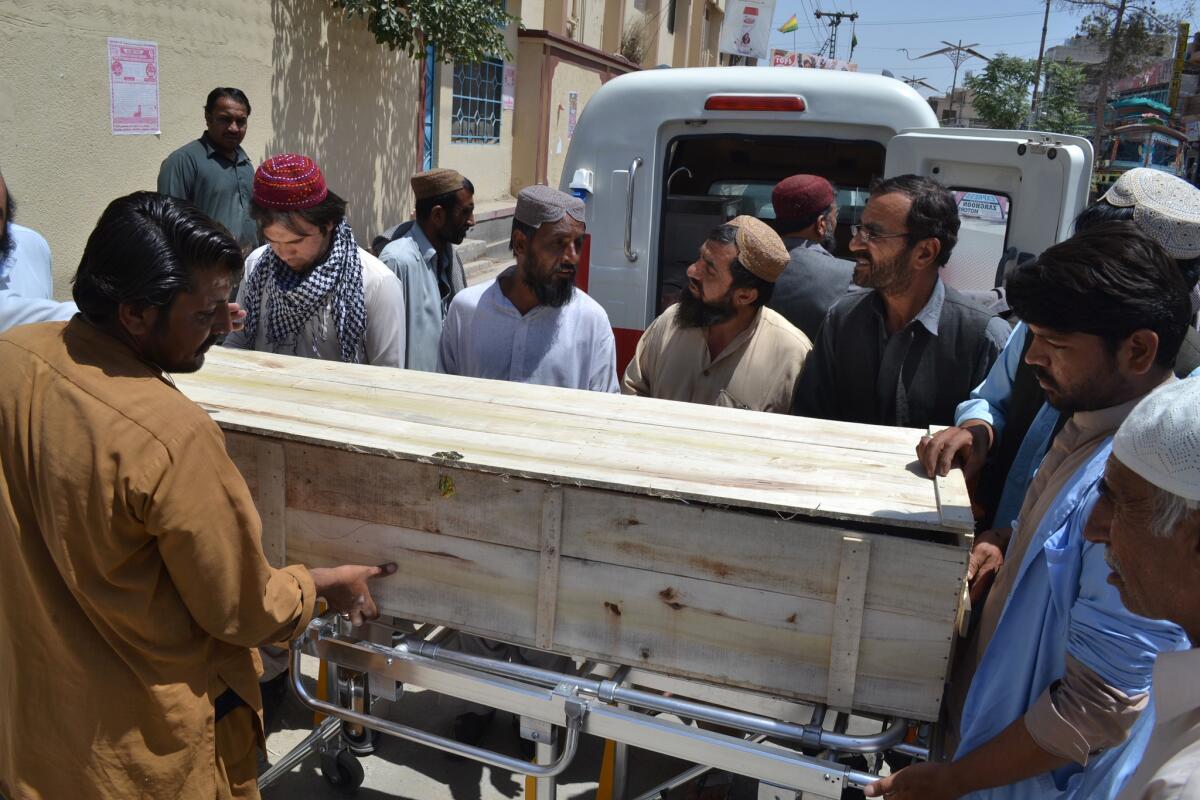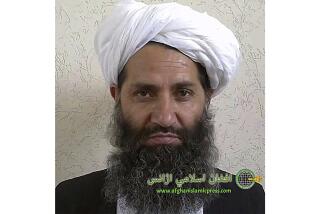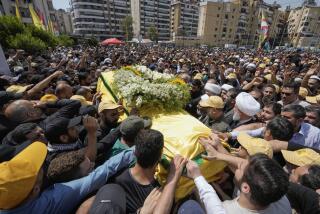Afghan Taliban appoints new leader after Mansour’s death

- Share via
Reporting from Kabul, Afghanistan — The Afghan Taliban has officially named a successor to its former leader, Mullah Akhtar Mohammad Mansour, who was killed in a U.S. drone strike in Pakistan last week.
“Haibatullah Akhundzada has been appointed as the new leader of the Islamic Emirate after a unanimous agreement in the shura.… All the members of shura pledged allegiance to him,” said a statement from the group released Wednesday, referring to the meeting at which the appointment was made.
The statement, which also called for three days of mourning, marks the group’s first public acknowledgment of Mansour’s death since the vehicle he was traveling in was struck by a U.S. drone in Pakistan’s Baluchistan province Saturday.
Mansour’s killing and Akhundzada’s election as the new amir al mumineen, or commander of the faithful -- as the group’s leader is known -- marks the second major transition in less than a year.
Mansour came to power last summer after it was confirmed that Mullah Mohammad Omar, the group’s founder and former leader, died in 2013.
During his brief tenure, Mansour oversaw a Taliban that managed to make major battlefield gains while faced with high-profile divisions and infighting.
The most notable conflict has been with Mullah Mohammad Rassool, who has headed a splinter group since November.
However, one former Taliban official said Akhundzada’s tribal affiliation could help lead Rassool back into the fold.
“Rasool is a Noorzai and so is Akhundzada -- as such, Rassool’s forces would have no choice but to accept and work with the new Taliban leader,” said Wahid Mujda, a former Taliban member that led Afghanistan until the 2001 U.S.-led invasion.
Mansour also had to contend with opposition from the family of the late Mullah Omar. Shortly after he was named the new leader of the group, Mullah Omar’s brother and son expressed their disapproval.
But on the battlefield, Mansour’s Taliban managed to be a formidable foe to both the Afghan National Security Forces and the U.S.-led international coalition.
The Kabul government used the announcement as an opportunity to once again urge the Taliban to embrace peace.
In a tweet issued shortly after news of Akhundzada’s election broke, the presidential palace said:
“Taliban groups have yet another opportunity to end and renounce violence, lay down their arms, and resume normal & peaceful life. Otherwise they will face the same fate as their leadership.”
The tweet is a clear reference to the killing of Mansour in Pakistan.
The government of President Ashraf Ghani has made several attempts to bring the Taliban to the negotiating table over the last year and a half. The Taliban, however, has repeatedly refused to engage in the process, citing the withdrawal of all remaining foreign forces as pre-condition to talks.
At a meeting in Islamabad last week, the Afghan ambassador to Pakistan, Hazrat Omar Zakhilwal, tried to get the Taliban labeled an “irreconcilable” group.
Zakhilwal was the only Afghan representative present at the fifth meeting of the Quadrilateral Coordination Group -- a four-nation body consisting of Afghanistan, China, Pakistan and the United States -- which has been working on regional efforts to bring the Taliban to the negotiating table.
Only months after Mansour took over the reins, the Taliban managed to capture the northern city of Kunduz for nearly two weeks last fall.
Though the Afghan National Security Forces, with assistance from foreign troops, were able to retake the city, the fall of Kunduz marked the first time since the U.S.-led invasion of 2001 that the Taliban was able to take over an urban center.
According to the United Nations, 2015 saw the highest civilian casualty rate in Afghanistan. Most of the casualties were said to be inflicted by the Taliban or their affiliated groups.
In a seeming bid to thwart the divisions that plagued Mansour’s rule, the Taliban called on supporters to unify around Akhundzada.
The new leader had previously served in the Taliban’s legal commission.
Haji Din Mohammad, a member of the High Peace Council, the group charged with negotiating with the Taliban, described Akhundzada as a “teacher” who stood out from his two predecessors.
See more of our top stories on Facebook >>
“He isn’t a fighter and he’s not a politician, he has a madrasa [religious school] where he teaches,” Din Mohammad said.
Whereas sources have described Mansour as “mercurial,” Din Mohammad said Akhundzada has none of that fiery temperament. “He isn’t cunning or conniving.”
Din Mohammad said it’s too soon to tell which direction the new leader will take the Taliban into, but these traits give a sense of “overall optimism” for the peace process.
The Taliban statement also named Akhundzada’s two deputies. Sirajuddin Haqqani, who had served as Mansour’s deputy, will take on the same role under Akhundzada’s rule. Haqqani is the leader of the Haqqani network, the group believed to be responsible for some of the most deadly attacks in the country.
Mujda, the former Taliban official, said there is likely an additional strategic angle to keeping Haqqani as the deputy.
“Haqqani is from the southeast and by keeping him as the first deputy, it’s their way of telling people in the southeast that they have representation and a say over the decision-making going forward,” Mujda said.
The second deputy, however, is a new name. Mullah Yaqub, the son of Mullah Omar, will also serve as a deputy to Akhundzada.
Both Haqqani and Yaqub were thought to be contenders for the top job.
Latifi is a special correspondent.
ALSO
Taliban leader Mullah Mansour believed killed in U.S. drone strike in Pakistan
Human rights groups say Saudi Arabia misused U.S.-made cluster bombs
‘Mohamed was a good pilot,’ father of EgyptAir captain says. ‘And he knows God’
UPDATES:
May 25, 4:45 a.m.: This article was updated with comment from the government in Kabul.
2:51 a.m.: This article was updated with more reporting.
11:52 p.m.: This article was updated with staff reporting.
This article was originally published at 10:10 p.m. May 24.
More to Read
Sign up for Essential California
The most important California stories and recommendations in your inbox every morning.
You may occasionally receive promotional content from the Los Angeles Times.










